Standardized culture of pearl clam has become a new benchmark for the transformation of traditional fishery green culture in China.
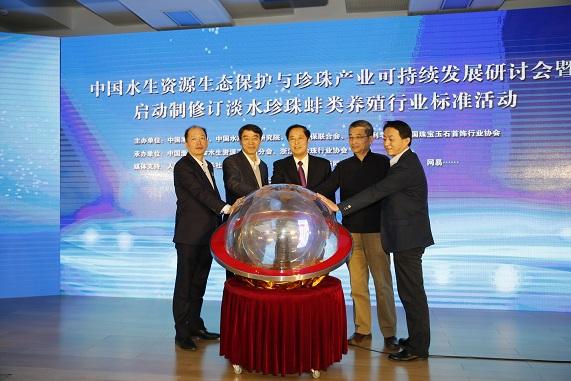
A few days ago, the "Symposium on Ecological Protection of Aquatic Resources and Sustainable Development of Pearl Industry in China" jointly organized by China Fisheries Association, China Academy of Aquatic Sciences, China Environmental Protection Federation, China Water Conservancy Society and China Jewelry and Jade Industry Association was held in the Ministry of Agriculture. This activity is hosted by the Aquatic Resources Handicraft Branch of China Fisheries Association and the Pearl Industry Association of Zhejiang Province. Chen Xiaohua, former vice minister of the Ministry of Agriculture and president of the China Green Food Association, Gui Jianfang, academician of the Chinese Academy of Sciences, Zhao Xingwu, former director of the Fisheries and Fisheries Administration of the Ministry of Agriculture and president of the China Fisheries Association, and other relevant leaders, fishery and shellfish experts, heads of government departments of key pearl clam farming provinces, as well as representatives of some farmers, a total of hundreds of people attended the event.
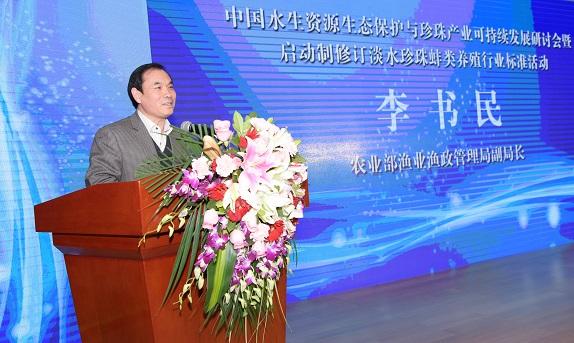
Up to now, the output of freshwater pearls in China accounts for more than 95% of the world, with an annual output value of more than 20 billion yuan, which is a national industry with great advantages. In the current era of global economic integration, Chinese freshwater pearls have become one of the most recognized jewelry in the world. Especially the Beijing Olympic Games, the Shanghai World Expo and the G20 Hangzhou Summit, Chinese pearl products are all on the list. At the same time, there are ten large pearl-related markets in China, including Zhuji in Zhejiang, Weitang in Jiangsu, Duchang in Jiangxi and Hanshou in Hunan, which regard the pearl industry as a local characteristic or pillar industry. According to incomplete statistics, the employment of pearl mussel breeding, processing and sales in China is close to 10 million, which is a characteristic industry involving a wide range of areas and a large number of employees.
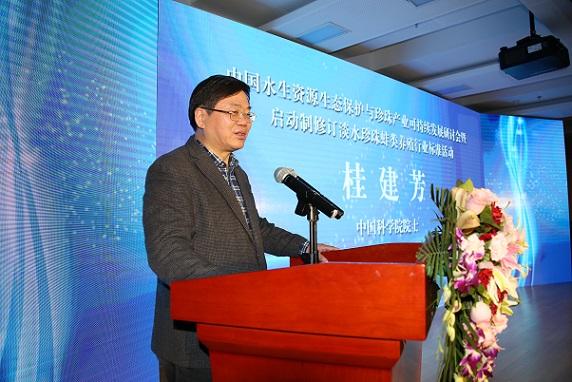
It is understood that under the background of the current national efforts to implement environmental protection, pearl clams, like other traditional aquaculture industries, have encountered development bottlenecks, and the extensive culture model of a small number of farmers affects the image of the whole industry. in fact, pearl mussel, like other shellfish, has a role in water purification. According to the research, an adult clam can filter more than 100 liters of water every day. By filtering and feeding the suspended particles in the water, it can effectively reduce the content of ammonia, nitrogen and phosphorus in the water and improve the water quality. Chen Xiaohua, former vice minister of the Ministry of Agriculture, pointed out at the meeting that "the activities held by the Fisheries Association are very necessary and timely, grasping the demands of the industry and keeping close track of national policies." our agricultural transformation and upgrading requires the transformation of an industry, an industry, and the research and development of a product and category. Gui Jianfang, academician of the Chinese Academy of Sciences, also mentioned at the meeting that "Pearl clam itself is a good species of clean water, and it is necessary to make full use of its characteristics and play its role in the process of building a beautiful China." this will drive the industry to develop in a more civilized direction. "
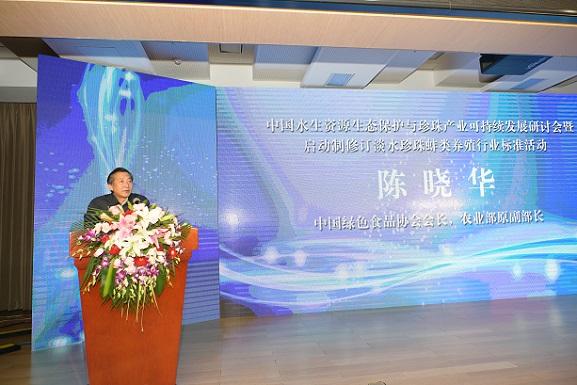
Pearl mussel culture as a small industry of traditional fishery culture in China, the first to start the protection project of aquatic resources in the industry is to actively respond to the national call that "green water and green mountains is Jinshan and Yinshan". At the meeting, Zhao Xingwu, president of the China Fisheries Association, said that "mussels, as one of the species of aquaculture, play an important role in ensuring food safety, purifying water with clams, expanding employment, promoting the structural adjustment of fishing areas, increasing fishermen's income, and increasing fishery efficiency." regional economic development has played an important role. In particular, it plays an irreplaceable role in promoting the development of pearl industry. It has become an indisputable fact that mussels are prosperous and pearls are prosperous; mussels are strong and pearls are strong; mussels develop greatly and pearls make great contributions. " According to the data of relevant research reports, there are nearly 300000 mu of pearl mussel culture area in the country, with about 800pearl clams per mu, and the clam cultured in the country can purify about 12 million tons of water every day, which is a very huge natural water purification system. Li Shumin, deputy director of the Fisheries Administration of the Ministry of Agriculture, said in his speech that "We can make use of the characteristics of pearl clams to combine with the treatment of water environment, and now we can promote circular culture in ponds, runway culture, and filtrating water with pearl clams." combined with local governments to control eutrophication water quality, we will form a benign development road that not only promotes farmers' employment, but also promotes environmental protection. "
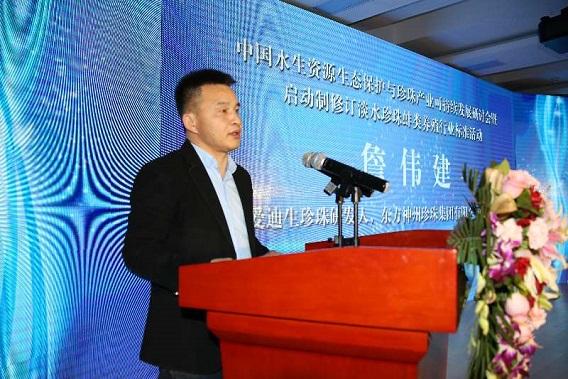
It is also understood that the meeting also started the revision and formulation of standards, and the China Fisheries Association will organize the National Aquatic products Standards Commission, experts from environmental protection and other relevant departments, as well as representatives of farmers, to set up an expert group for revision and formulation. The next step is to carry out a visit and investigation to key provinces in the country, and to revise and formulate a new standard for freshwater pearl mussel culture industry in line with the current development needs and environmental protection requirements. The long-term mechanism of pearl mussel culture was established. On the basis of making and revising the new national industry standards, this paper explores the effective methods for the industry associations to link with the relevant local functional departments, and urges the implementation of the new standards of freshwater pearl mussel culture industry in line with green environmental protection. It is proposed to implement the declaration, examination and approval, license-holding culture of pearl mussel culture, establish a substandard exit mechanism, and implement the director responsibility system, one market, one file and other effective measures.
The meeting also gathered the largest farmers from seven key pearl clam farming provinces across the country. Among them, Zhan Weijian, the representative of Edison Pearl Research and Development and chairman of Oriental China Pearl Group Co., Ltd., said at the meeting, "We have the determination and confidence to carry out self-regulation and self-regulation." can resolutely implement national and local laws and regulations, crack down on farming without approval and random throwing of livestock dung, and resolutely ban it if it is found that it has been reported. " At the same time, he also said that while developing the pearl industry, we are more willing to include pearl clam culture in local pollution control measures, so that pearl clam culture can receive the same policy support as other fishery cultures. releasing pearl clams into eutrophication rivers and ponds can not only promote local economic development and increase farmers' income and become rich, but also make a contribution to the country's beautiful environment. "
- Prev
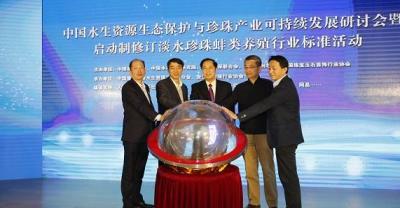
Does Atractylodes macrocephala Koidz raise chickens to make money? Native chicken breeding technology, laying hen breeding technology, complete collection of chicken breeding technology
Tips for raising chickens, techniques for raising chickens, raising chickens with Atractylodes macrocephala, folk prescription for raising chickens, raising chickens with Atractylodes macrocephala, and Atractylodes lancea to treat chicken diseases. Do you make money by raising chickens? Native chicken breeding technology, laying hen breeding, eggs.
- Next
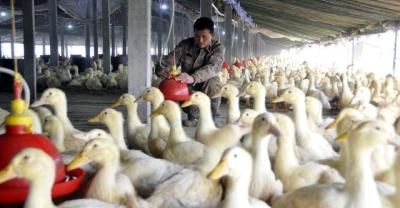
How to breed cold water? Introduction to the culture methods and matters needing attention of cold water spray
Cold water is a perennial herb with strong adaptability and easy to raise, so it is a very popular small foliage plant. Cold water blooms yellow and white in summer and autumn.
Related
- On the eggshell is a badge full of pride. British Poultry Egg Market and Consumer observation
- British study: 72% of Britons are willing to buy native eggs raised by insects
- Guidelines for friendly egg production revised the increase of space in chicken sheds can not be forced to change feathers and lay eggs.
- Risk of delay in customs clearance Australia suspends lobster exports to China
- Pig semen-the Vector of virus Transmission (4)
- Pig semen-the Vector of virus Transmission (3)
- Five common causes of difficult control of classical swine fever in clinic and their countermeasures
- Foot-and-mouth disease is the most effective way to prevent it!
- PED is the number one killer of piglets and has to be guarded against in autumn and winter.
- What is "yellow fat pig"? Have you ever heard the pig collector talk about "yellow fat pig"?

